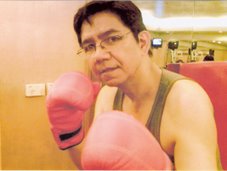I got my first taste of the fastfood business sometime in April of 1983 when I joined Foodmine Inc.,the local franchisee of Kentucky Fried Chicken owned by the Quesada family. I joined the company as an HR (Training) Specialist and eventually was made its HR Officer when my boss, Joseph Hernandez,resigned in 1985.
The QSR industry, which was better known then as the "fastfood business," was just starting to grow and was regarded as the sunrise industry.
If I remember correctly,Shakey's Pizza was the industry leader. KFC,which had 14 outlets by 1984,was sometimes at second place and sometimes at third.
McDonald's,which opened its doors in the Philippines sometime in 1978 was a fast rising star and was KFC's closest rival for second place.
But the "dark horse" that finally beat all the internationally known brands turned out to be a homegrown burger chain called, Jollibee.
While I was at KFC, we didn't pay too much attention to Jollibee as a threat. The brand we were worried about was McDonald's. In fact,we benchmarked ourselves against McDonald's which we regarded as the standard of a well-managed operation. We went to the extent of getting ourselves a store tour inside their New Frontier outlet by posing as College professors who were supposedly curious about learning McD's inner workings.
I have to admit that I was impressed with what I saw during that tour!Everything was done according to the QSC standards we were trying to impose at KFC!
Our problem at KFC then was how to get the store crew to follow standard procedures as outlined in the KFC Operations Manual. Compliance to these standards was a "must" if the owners wanted to retain their franchise. Unfortunately,since the crews of KFC were mostly "old" personnel from the Quesada family's Bonanza restaurant,it was an uphill battle trying to convince them to do things by the book.
Complicating this scenario was the fact that KFC was unionized. You had to get the union leaders' cooperation first before you could implement any "standard practice." Of course, any initiative we took to improve store operations was looked at with suspicion because we, at Training, were part of management.
This struggle between management and union came to a head when in 1984,the union went on a wildcat strike that lasted for about 3 weeks. When management sued for peace and the strike ended though,things were never the same again. The union members who felt they had won a moral victory were now more emboldened to make things difficult for management. If they didn't like something that management imposed they would threaten to go on strike,and management would back down. What's worse was that top management took it against the store managers for not being able to impose discipline on their crews.
A case in point was the implementation of forced ranking in the performance appraisals of the crew. The union saw this as an unfair way of assessing them and so directed its members not to sign their performance appraisals. Top management issued a directive to all managers to make sure the P.A.'s were duly signed or else face the possibility of disciplinary action.
Because of this,the store managers in the KFC branches eventually became demoralized. There was a mass exodus of managers such that at one point almost 90% of them had resigned. Since I was head of the Training department at the time I had a difficult time filling up our stores with half-baked management trainees who only had 2 weeks of crash training.
Many of those who left, applied for store manager jobs at Jollibee. During the first quarter of 1985, KFC Area Manager Jimmy Enriquez, Store Manager Raffy Selga,Assistant Managers MeAnn San Juan, Livia Pingol and Bambi Bejo were accepted into the Jollibee family.
Those of us who were left behind at KFC started hearing stories from our former colleagues about how well-managed Jollibee was and how better off they were compensation and benefits-wise.
It wasn't long before I myself started looking at the option of joining Jollibee.
I learned that Jollibee was planning on opening a Jollibee Training Institute which would be its equivalent of McD's Hamburger University. To spearhead the project they had hired a professor from the University of Maryland, a Dr. Ambrosio "Butch" dela Cruz and started looking for trainers from the fastfood industry to help him set it up. Although I had just been recently been promoted to my HR Officer position at KFC, I decided to send in my resume.
After about 3 months of waiting, I finally joined Jollibee on June 26, 1985 as a Training Specialist of Jollibee's Training Institute.
It was to be the start of an exciting, fulfilling and very rewarding career in a company that was soon to become one of Asia's most admired companies.
Subscribe to:
Post Comments (Atom)


No comments:
Post a Comment